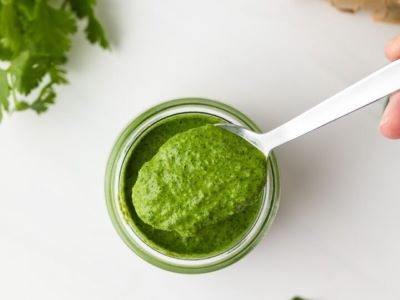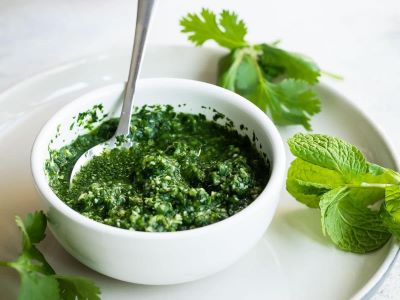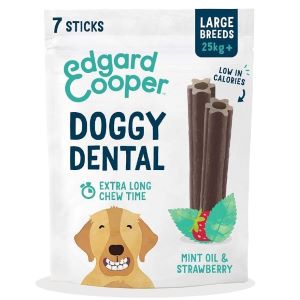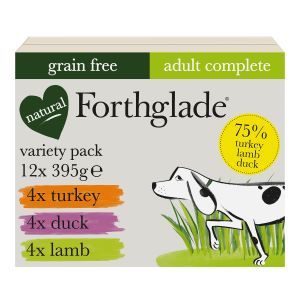Let’s talk about mint🌿 sauce and our furry friends. You know, that tangy, fresh sauce we pour over roast lamb? It’s a tempting sight, but it leaves us with a pressing question: Can dogs have mint sauce? Well, your dog might be eyeing it with curiosity.🐶

Today, we’ll explore whether mint sauce is a yummy addition to your dog’s meal or if it’s better left off their plate. So, stick around as we find out if dogs and mint sauce are a good mix or not! 🍽️
Key Takeaways
- Mint sauce may upset a dog’s stomach if given in excess. Use moderation.
- Safer flavour alternatives include herbs, broths, and homemade dog-friendly sauces.
- Risks include toxic ingredients like onion, garlic, xylitol, and additives causing allergies.
- Mint has limited benefits compared to ginger, chamomile, parsley, and basil for dogs.
- Avoid store-bought mint sauces for humans. Opt for pet-safe ingredients. Small mint amounts may be okay.
You Might Also Like:
Can Dogs Have Mint Sauce?
Mint sauce is a delightful condiment made from simple ingredients. The primary components typically include fresh mint leaves, vinegar, sugar, and sometimes a pinch of salt.
These ingredients combine to create that tangy, refreshing flavour that pairs so well with roasted meats🍖, especially lamb. Its zesty and slightly sweet taste cuts🍬 through the richness of meat dishes, providing a refreshing contrast.
Now, let’s address the pressing question: Can dogs have mint sauce? While a tiny taste of mint sauce probably won’t harm your furry friend🐶, it’s essential to consider a few factors:
- Ingredients and preparation: Mint sauce often contains ingredients like vinegar and sugar, which, in excess, can upset a dog’s stomach. Some commercial mint sauces may include additives or preservatives🥫 that are not ideal for dogs.

- Portion control: Even if the ingredients are generally safe, moderation is key🔑. Dogs have sensitive digestive systems, and too much mint sauce can lead to gastrointestinal distress.
Alternatives to Mint Sauce for Dogs
If you’d like to add some flavour to your dog’s meals without the potential risks of mint sauce, there are safer alternatives:
- Fresh herbs: Consider using fresh herbs like parsley or basil🌿. These can be finely chopped and sprinkled on your dog’s food for a burst of flavour without the added sugars or kinds of vinegar.
- Broth or stock: A small amount of low-sodium chicken🍗 or beef broth can make your dog’s meal more appealing and add moisture.
- Dog-friendly condiments: You can create your own dog-friendly sauces using ingredients like plain yoghurt🥛, unsalted chicken or beef broth, and a dash of dog-safe herbs like sage or rosemary. Just be sure to check for any allergies or sensitivities your dog may have to specific ingredients.
Risks of Mint Sauce for Dogs
When it comes to sharing human food with our furry companions, it’s essential to be aware of potential risks, especially when it comes to condiments like mint sauce. Let’s see the specific risks associated with feeding mint sauce to dogs:
Toxic Ingredients
- Onions and Garlic: Many mint sauce recipes include ingredients like onions or garlic🌰, which are toxic to dogs. These Allium plants can lead to oxidative damage to a dog’s red blood cells, potentially causing anaemia[1].
- Xylitol: Some commercial mint sauces may contain xylitol, a sugar substitute commonly used in sugar-free products. “Xylitol is highly toxic to dogs and can lead to rapid insulin release, resulting in hypoglycemia (low blood sugar)📉, seizures, and even liver failure”, says Dr Veronica Higgs at PetMD.
- Additives and Preservatives: Store-bought mint sauces may contain various additives and preservatives that can be harmful🚫 to dogs. These chemicals can cause gastrointestinal upset and, in some cases, allergic reactions.

Allergies and Sensitivities
Dogs, like humans, can have food allergies and sensitivities. While mint itself is not a common allergen for dogs, the other ingredients in the sauce, such as vinegar or preservatives, might trigger allergic reactions in some dogs.🐶
Symptoms of food allergies in dogs can include itching, skin rashes, digestive upset (vomiting or diarrhoea), and even respiratory issues[2].
Digestive Problems
Mint sauce, with its tangy taste, can be relatively acidic. Feeding your dog acidic foods in excess can lead to digestive discomfort, including acid reflux🔥, upset stomach, or diarrhoea.
The sugar content in some mint sauces may also be problematic for dogs, potentially causing spikes📈 in blood sugar levels, leading to energy crashes, and increasing the risk of obesity over time.
Benefits of Mint for Dogs
While mint can offer some potential benefits for dogs, it’s essential to acknowledge that these benefits are limited compared to other herbs and spices.
Limited Benefits
Let’s explore the benefits to your dog’s health:
- Breath Freshener: Mint’s fresh and aromatic properties can help improve your dog’s breath. Some dog dental🦷 products contain mint to combat bad breath.
- Calming Effect: Mint may have a mild calming effect on dogs, potentially helping with anxiety or stress in some cases.
Better Alternatives for Canine Health
there are more effective and safe alternatives available. Herbs like ginger and chamomile offer superior digestive and calming properties, while nutrient-rich herbs like parsley and basil can enhance your dog. Here are more of them:
- Digestive Herbs: When it comes to improving digestion and soothing upset stomachs, there are better alternatives like ginger and chamomile. Ginger can alleviate nausea, while chamomile has anti-inflammatory and calming properties.

- Breath Freshening: If you’re looking for effective ways to freshen your dog’s breath, dental chews and regular teeth brushing are more reliable options than relying solely on mint.🪥
- Nutrient-Rich Herbs: Instead of mint, consider incorporating nutrient-rich herbs like parsley or basil into your dog’s diet. These herbs offer vitamins💊 and minerals while enhancing the flavour of their food.🌱🌿
- Avoid Potential Risks: Remember that while mint itself is generally safe for dogs, mint sauces or products designed for human consumption may contain ingredients like garlic or xylitol, which can be toxic.
FAQs
Can a Dog Eat Mint Leaves?
Dogs can safely eat one or two fresh, plain mint leaves daily. However, feeding your dog mint leaves in excess may upset their digestive system. Stick to serving them a few small bites of mint occasionally, rather than regularly.
Can Dogs Have Mint Sauce?
Whilst some fresh mint leaves may be fine for your dog in small amounts, mint sauce is not fine for dogs. The reason for this is not because of the mint, but because of the other ingredients included in the sauce. These include vinegar, salt, sugar, and other additives or preservatives.
Can Dogs Have Mint Toothpaste?
It is not safe for your dog to have mint. Products that contain mint may also contain xylitol, which is a type of sugar alternative sweetener that is toxic to dogs. Mint products such as gum, candy, and toothpaste can contain the toxic ingredient, xylitol.
Can Dogs Eat Mints for Bad Breath?
Mint products can cause health problems. Dogs should never consume mint products meant for humans, including breath mints or candies, which contain chemical ingredients and added sugars that may cause tooth decay, elevated blood sugar, and weight gain in canines.
Summary
We’ve uncovered a subtle story of culinary temptation and cautious consideration, so “Can dogs have mint sauce?”
While a small taste of mint sauce may not pose an immediate threat to your dog, it’s essential to recognize the potential risks associated with toxic ingredients, allergies, sensitivities, and digestive discomfort.
So, when it comes to pampering your pup, there are safer, tastier, and healthier options available to ensure their dining experience remains both enjoyable and safe.
Reference:






